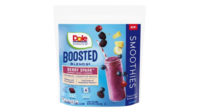A smoothie consisting of strawberries, apple juice and sherbet was fine ten years ago, but it’s not what most consumers are after today. Now, many people want to put a limit on their sugar intake, and want their smoothie to serve a purpose, like help them meet a personal health goal.
Today’s smoothie may still contain the refreshing taste of fruit, but it also has vegetables, berries, maybe a dash of ginger. It’s a beverage of subtle flavors, with a health purpose – to boost energy, build muscle or prepare for a workout.
These are the observations of two leaders in the smoothie industry, Matt Dugan, corporate executive chef at Vitamix, and Rocky Gettys, vice president of product development for Smoothie King, on the occasion of National Smoothie Day, June 21, which is also the first day of summer. Dugan and Gettys closely track quick-service smoothie menus, trending online smoothie recipes, and social media posts representing the vanguard in home experimentation in smoothie recipes.
“The public’s taste buds have changed,” explained Dugan. “What tasted good before now tastes too sweet to many people.”
“In lieu of sweetness, people are becoming open to new and different combinations of flavors in their smoothies, for example, basil and strawberries or mango and chipotle,” Dugan explained. “The American palate, especially among the younger audiences, is become more enterprising, curious and open to new, unfamiliar flavors.”
The U.S. smoothie market continues to grow at a steady clip. In 2020, Smoothie King opened a record 263 new stores globally, growing to over 1,300 stores worldwide, and closed out the second half of the year with a 12.2% increase in comparable sales. Other leading smoothie franchises, such as Tropical Smoothie Café, also reported double-digit growth in 2020.
Purpose-Based Smoothies
If people want less sweetness in their smoothies, they also want more purpose, according to Dugan and Gettys. People have become very health conscious. They have specific goals in mind, and they are looking to smoothies to help them along in their journey.
“People are not just seeking out healthy foods – they are looking for a combination of ingredients that will serve a tangible and specific purpose,” Gettys explained. “That places a particular onus on made-to-order smoothie chains to deliver a product that connects the dots.”
Many quick-service smoothie restaurants are already leaning toward menu concepts that are based on purpose: smoothies for pre- or post-workout, for immune health, for joint health, for energy, for detoxification, for losing weight and staying fit, for staying calm or managing anxiety, for protein and muscle building, etc.
For example, Smoothie King’s Stretch & Flex™, which is promoted by three-time gold medal gymnast Gabby Douglas, contains collagen, tart cherries and plant-based proteins. Another favorite – and a summertime limited-time offer – is Hydration Watermelon, which contains refreshing watermelon and an electrolyte blend that contains sodium, potassium and other electrolytes. It delivers more electrolytes than the leading brands of sports drinks, Gettys noted.
Vitamix and Smoothie King are predicting that the move toward purposeful smoothies will continue. New areas of consumer interest may include brain health and skin health, alongside seasonally relevant areas of interest, such as cold and flu in the winter, and energy and hydration in the summer.
Less Sugar, More Plants, Herbs and Spices
As the smoothie market adjusts to the public’s concerns around excessive sugar, Gettys and Dugan are expecting to see sugary ingredients, such as sorbet, sherbet, honey, fructose, purees, and syrups play a less prominent role in quick-service smoothie recipes. On the other hand, kale, spinach, carrots, and other vegetables will continue to gain ground, they said.
“The blending of tropical fruits with greens is a real winner in today’s smoothie market,” Gettys noted. “You have to remember that while a smoothie must be healthy, it also needs to taste good. So, mixing the antioxidant richness of vegetables with the allure of tropical flavors is the sweet spot for smoothies right now.”
“We are seeing a fast-growing interest in anything plant-based,” Dugan added. “It’s not just vegans and vegetarians who are interested in plant-based nutrition. There is a broad-based awareness that vegetables, berries, seeds and whole grains play a very important role in our diet.”
Herbs and spices are another set of ingredients that are helpful in managing sugar content in smoothies, and they are gaining a foothold on smoothie menus in quick-service restaurant menus. “When you blend ginger, cinnamon, cocoa, or other herbs and spices into a smoothie, you are adding not only healthful ingredients, but also flavor, and that means you can use less sugar to get a great tasting smoothie,” Gettys said.
While many things about smoothies are evolving, Dugan and Gettys maintain that the category remains essentially stable as a nutritious, calorie-dense beverage that benefits one’s health. Certain fruits are mainstays, such as strawberries, mango and banana. Other ingredients are introduced as the science about what is healthy changes and people’s tastes and preferences evolve.
Always a Treat
While smoothies are intended to be healthy, some people may prefer more sweetness or more richness by way of flavors like chocolate, peanut butter or other nut butters, or frozen yogurt. This is one reason why customization is an important component on smoothie menus.
“No smoothie operator wants to play nutrition police and force consumers into a rigid set of guidelines. We’re here to give people flexibility to choose what is right for them,” Gettys explained. “That’s why you are going to see more customizable options on smoothie menus, even as the menu overall becomes less sweet and more healthy.”
According to market research, the generation most interested in smoothies is Gen Z, closely followed by Millennials. These are also the generations most interested in choice and customization. The challenge for quick-service smoothie restaurants is to introduce customization without slowing down the ordering process or introducing the risk of someone ordering a combination of ingredients that do not go well together.
“The best model for customization is one that holds some ingredients stable while inviting choice on some others,” Gettys explained. “For example, customers can substitute one fruit or vegetable for another; choose among nut butters; or choose between milk and other non-dairy options, like oat milk and almond milk. We are always open to substitutions at Smoothie King, but we also want to steer our customers toward what tastes good.”
About Smoothie King Franchises, Inc.
Smoothie King Franchises, Inc., the original U.S. smoothie franchise, is a privately held, Dallas-based franchise company with more than 1,000 units worldwide. It was founded in 1973 with the mission to help others achieve better health in a delicious way through smoothies.
Today, it continues its mission to inspire a healthy and active lifestyle through its Clean Blends initiative, which focuses on great-tasting smoothies with more whole fruits and vegetables while removing artificial flavors, colors and preservatives and added sugars in many of its blends.
Smoothie King extends its vision to be an integral part of every health and fitness journey through partnerships with the Challenged Athletes Foundation and the Smoothie King Center. The franchise is currently ranked No. 1 by Entrepreneur magazine in the juice bar category for the 29th consecutive year, ranked No.14 overall on the “2020 Franchise 500” list and debuted on the “Inc. 5000” list in 2018. The company also offers retail products that include sports beverages, energy bars, vitamins, supplements and more. For franchising opportunities, visit smoothiekingfranchise.com.
About Vitamix
The Vitamix family of companies, privately held and family-owned and -operated since 1921, is currently celebrating its 100th anniversary. Millions of people around the world employ Vitamix machines to prepare nutritious whole foods in their home kitchens and deliver exceptional and consistent results in their commercial kitchens. The company’s commercial customer list reads like a who’s who of major restaurant chains, and gourmet chefs say their Vitamix machines are as important to them as their knives. The company developed the first true commercial production-grade blender in the early 1990s, igniting the smoothie and frozen coffee movements, and has been named the Best in Class Overall beverage blender for nine consecutive years by readers of Foodservice Equipment & Supplies magazine. Vitamix continues to win awards for its products, culture and user experience and is found in more than 130 countries. The company is headquartered in Olmsted Township, Ohio, near Cleveland.





